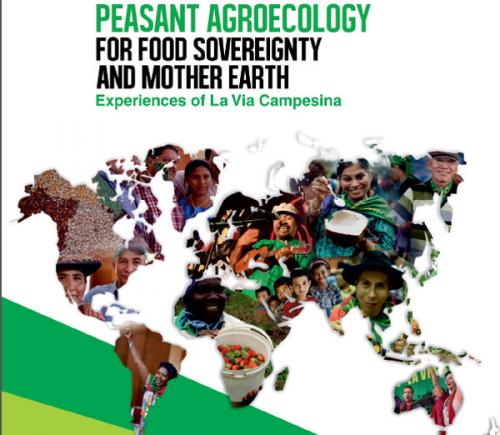Peasant agroecology for food sovereignty and mother earth
- Opinión

Table of contents
IALAS: Agroecology Training Schools
La Via Campesina South America
Shashe Agroecology School: A true centre of Agroecology and Practical Food Sovereignty
La Via Campesina Africa 1
Agroecology and Community-Supported Agriculture in Mozambique: A Peasant Alternative to Industrial Agriculture
La Via Campesina Africa 2
Zero Budget Natural Farming in India
La Via Campesina South Asia
We do not inherit land from our parents; we borrow it from our children
La Via Campesina Europe
Migrant farm workers build a people’s agroecology in North America
La Via Campesina North America
The Goddesses’ Cooperatives in northern Nicaragua: a new model of agroecology and gender equality
La Via Campesina Central America
Producing our own seeds: alternative or necessity?
La Via Campesina Caribbean
A Peasant Program for Supplying Healthy Food for People
La Via Campesina South America
Organized peasants feed Bogotá with high quality, healthy food at a fair price
La Via Campesina South America
Declaration of the International Forum for Agroecology, Mali 2015
Introducction
We, as women, men, elderly and young people, peasants, family farmers, indigenous peoples, day laborers, landless rural workers and other rural peoples, are fighting to defend and recover our land and territories, to preserve our way of life, our communities, and our culture. We are also defending and recovering our territories because the agroecological peasant farming we carry out there is key to constructing food sovereignty, and is our first line of action in our defense of Mother Earth. We are committed to producing food for people – the people of our communities, villages and nations – instead of producing biomass for cellulose or agrofuels, or exports for other countries.
The indigenous peoples in our midst, and all our traditions and rural cultures, teach respect for Mother Earth, and we are committed to recovering our ancestral agricultural knowledge, so that we may produce in harmony with, while we protect, our Mother Earth. Ours is the “model of life”, of the countryside with peasants, of rural communities with families, of territories with trees and forests, mountains, lakes, rivers and coastlines, and is in firm opposition to the “model of death” of agribusiness, of farming without peasants or families, of industrial monocultures, of rural areas without trees, of green deserts and land poisoned by chemical pesticides and genetically modified organisms. We are actively challenging capital and agribusiness, disputing land and territory with them.
When we control our own territory we aim to put into practice peasant agroecology based on local systems of peasant seeds, which is more beneficial to Mother Earth, as it helps to cool the planet, and which has been demonstrated to be more productive per unit area than industrial monoculture, offering the potential to feed the world with healthy, wholesome, locally produced food, while guaranteeing us and future generations of rural peoples a decent life. Food sovereignty based on agroecological peasant farming offers solutions to the food crisis, as well as to other crises also caused by capitalismwhich humanity is currently facing.
We believe that the origin of agroecology lies in the accumulated knowledge and knowhow of rural peoples, systematized by a dialogue between different types of knowledge (“diálogo de saberes”) in order to produce the “science”, the movement and the practice of agroecology. Just as is the case with seeds, agroecology is the heritage of rural peoples and must be placed at the service of humanity and Mother Earth, without cost or patents. It is “ours” and is not for sale.
We must remember, retrieve, document, exchange, share, disseminate, teach and use this knowledge of our peoples actively, whilst defending it against cooption, privatization and distortion. Many of our organizations have processes for recovering, recompiling, sharing and teaching this knowledge of the science of peasant agroecology, via local processes and community groups, formal and informal schools, and horizontal exchange processes, such as from peasant to peasant, family to family, community to community and from organization to organization, as well as through videos, bulletins and community radio programs, pamphlets, publications, leaflets and other creative ways of sharing and transmitting our knowledge of agroecology.
We are, however, aware that agroecology is currently under threat from attempts at cooptation. Partly owing to our success in promoting agroecological transformation from the bottom up, now even conventional institutions are beginning to regard agroecology as an important set of alternatives. The institutional vision of agroecology is nevertheless very different from ours, and that worries us.
* Complete text in PDF
Notebook No. 7, November 2015
Del mismo autor
- Souveraineté alimentaire et solidarité : un moment historique pour faire avancer nos luttes paysannes 16/04/2021
- "The Declaration on Peasants' Rights should become a political tool for Agrarian Reform and Social Justice" 17/04/2019
- “La Declaración de Derechos Campesinos debe ser una herramienta política para la Reforma Agraria y la justicia social” 17/04/2019
- Histórica victoria campesina 19/12/2018
- L'industrie des biotech tente de paralyser la Conférence de l'ONU sur la biodiversité, elle ne paralysera pas les paysans 06/12/2018
- The biotech industry is trying to block the UN Conference on Biodiversity, but it won't block farmers 06/12/2018
- La industria biotecnológica está tratando de paralizar la Conferencia de la ONU sobre Biodiversidad, ¡no paralizará a lxs agricultorxs! 06/12/2018
- Nations unies : la Troisième Commission approuve la Déclaration sur les droits des paysans et autres personnes travaillant dans les zones rurales 22/11/2018
- Naciones Unidas: El Tercer Comité aprueba la Declaración sobre Derechos Campesinxs y otras personas que trabajan en áreas rurales 21/11/2018
- Third Committee approves the UN Declaration on the Rights of Peasants and Other People Working in Rural Areas 20/11/2018
